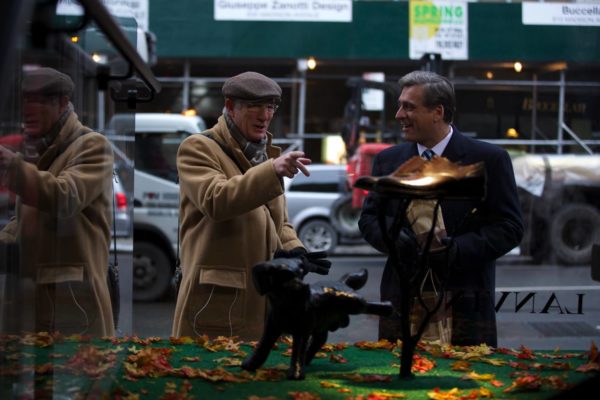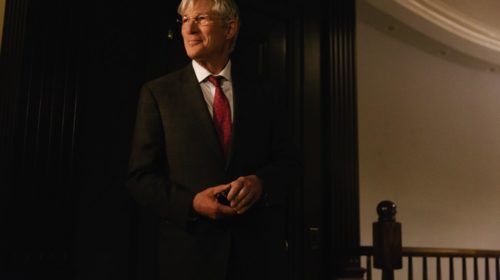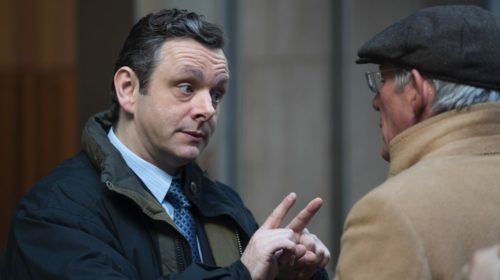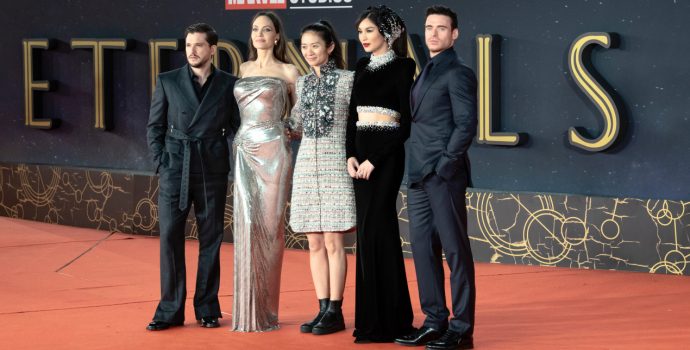American actor tells us about his role in new Joseph Cedar’s film
Norman: The Moderate Rise and Tragic Fall of a New York Fixer may be a long title, but there’s no better description for Joseph Cedar’s new film. The rise-and-fall narrative fits perfectly the story of the lonely hustler played by Richard Gere, in one of his best performances to date.
The film hits italian theaters on September 28 and features (literally) a parade of stars: Lior Ashkenazi, Steve Buscemi, Michael Sheen, Charlotte Gainsbourg and Dan Stevens.
Gere plays Norman Oppenheimer, a New York “consultant” looking for prominent friends to get recognition: he makes a living by building connections between them, hoping to get their respect and enter the circle of VIPs. His life changes when he befriends israeli politician Micha Eschel and gives him a pair of expensive shoes as a present: three years after their first encounter, Eschel becomes Prime Minister and Norman expects something in return. Will he really get the recognition he’s looking for? The film skillfully tells the story of a clash between friendship and power, exploring both languages of comedy and drama.
Richard Gere introduced the film to the italian press this morning, in Rome.

How would you describe your character?
«Wherever I show this movie people say “He’s so annoying. Why doesn’t he just go away?” Unfortunately, I think that this is a world that is transactional right now. Every encounter is “What do I get out of it?” and “What can I do to get what I want?” rather than the way it was in village life: many centuries ago, the community was on the same way and had a similar vision of possibility and everyone knew their place in activating and manifesting that vision. Unfortunately we don’t have that right now. We have a President of the U.S.A. that is completely transactional: there’s no moral sense in anything he does. Maybe that’s the positive thing of someone like him: we see the mirror of ourselves in him and we can correct and improve how we behave in the world. In the movie, Norman is one of those peculiar characters who’s both things at the same time: he’s transactional, but he’s also a true heart. He really wants people to be happy; the other side of it is that, if they’re happy, he’s included. There’s a place for him literally at the dinner table. He’s this kind of wonderful combination of both sides of our nature.»
This is a very different role compared to the iconic characters we saw in American Gigolo and Chicago, there’s a change in your phisicality. How did you prepare to play Norman?
«It was very easy, because Norman is actually who I am! The phisicality of him… he’s a very New York character for sure. He’s a very Upper West Side jewish man. I’ve lived in New York since I was 20 and, in my memory bank, I have so many Normans: it wasn’t very hard for them to come to the surface and present themselves. I didn’t have to think about it all that much.»
In the film emerges a clear hierarchy: there are people who have the power and those who have to suffer it…
«It doesn’t matter if you work in the world of journalism, the world of entertainment, the world of politics: there’s always a core center of people who control it. They are the “cool kids” and there’s always a group of people around the edge who struggle to find a door that is unlocked and try to get in. This is typical all over the world. What is unique about Norman is that everything in his life is a lie, but he has a good heart.»
Everyone is praising your performance as Norman and some people say maybe it’s time for The Academy to notice you. What do you think about it?
«The only thing that interests me, about winning an Oscar, is that it would make it easier for me to do more of these independent films. »
During the film Micha describes life as a wheel of fortune: sometimes you’re lucky and sometimes you’re not. What do you think about this vision as an actor and as a Buddhist?
«Once you have money, and you’re able to have good, expensive wine, it’s very difficult to lose money and have really bad wine. Obviously I’m kidding! These cycles of course are always turning, even within a day they change, our mood changes. This is happening at all levels, nothing is constant. Every breath is a death, every breath is a wheel turning. We get into trouble when we think there is permanency, that things are eternal and that they will always be as they are now. When we accept the big reality that we’re cycling through in these wheels, we can find true happiness.»










